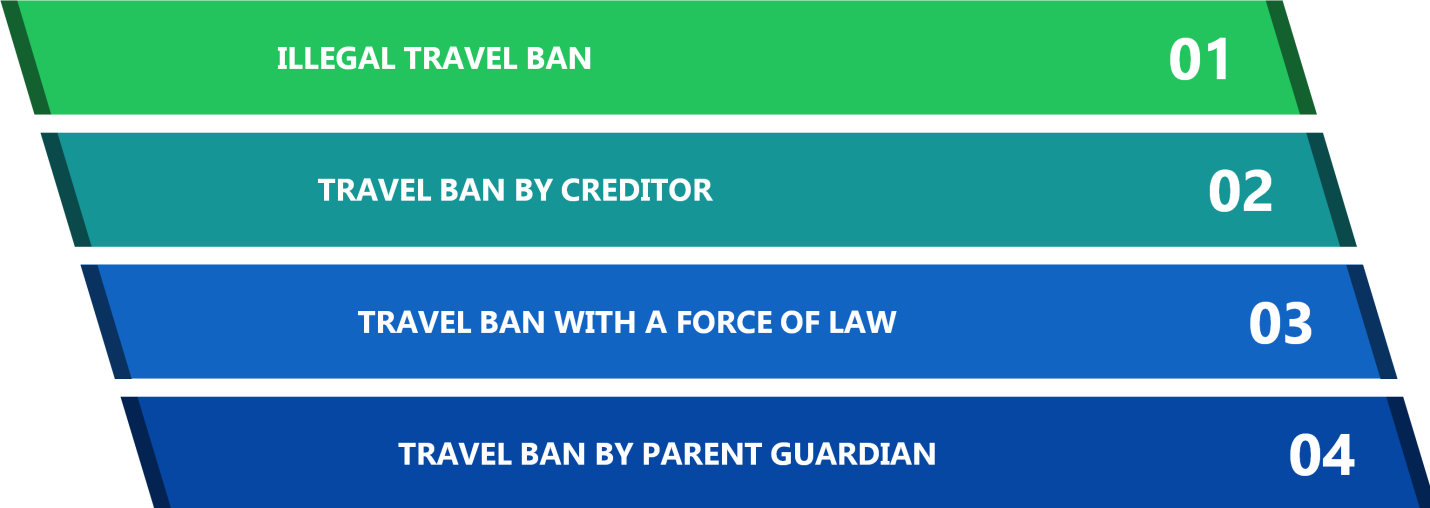A renowned Chinese Novelist Gao Xingjian once said ‘Walk where your heart leads you, there are no restriction and burdens’
Whatever value you place on the preceding quote, the truth is that it is not always a reality in this world. However, international conventions, rules, and regulations such as the Universal Declaration of Human Rights and International Constitutions manage to guarantee individuals the right to some freedom of movement, both within and outside the country, as long as that freedom is exercised in a legal manner. According to the Constitution, no one can be barred or exempted from travelling within or beyond the UAE, and no one can be forced to live in a restricted region unless such a prohibition is authorized or carried out in line with the law.
The law of the land states that a person may be barred from travelling within or beyond the UAE if the official authorities have the authority to do so and their actions are consistent with certain Statutory Law. An essential point to note is that the travel restriction applies not just to cases where a person is under criminal investigation, but also to circumstances where the person being barred is a debtor and his creditor has asked the court to order a travel ban against him. Thus in today’s blog we will discuss all the details that you should be familiar about the Deportation Order and a Travel Ban. So without any further ado, let’s learn!
An Overview
It should be noted that the creditor has the right to file an application with the judge or the head of the competent body, demanding the issuing of a travel ban against the debtor, as provided for in Article 329 of the Civil Procedure Code (as amended by Federal Law Number 30 of 2005).
- The UAE's Penal Laws, on the other hand, provide specifically spelled out procedures for deporting foreign nationals who constitute a threat to the country's national security and domestic tranquilly.
- Foreign nationals, on the other hand, may be deported from the country if they commit a felony involving narcotics, immigration, or moral turpitude. It's worth noting that the Emirati Constitution states that only foreign nationals can be deported and that UAE citizens cannot be expelled from the country.
UAE has separate laws for travel ban and deportation and therefore, there may be a case where travel ban and deportation order is passed against the same foreigner.
A travel ban is basically an executive order or a written order given by the judge due to certain reasons, and the travel ban is lifted only when such reasons cease to exist. There can be many reasons for which a judge can impose a travel ban on a person, including the requests made by custodian, guardian or creditors.
Travel bans can be imposed for a variety of reasons
For example, it could be enforced in accordance with the law, through a creditor's claim, or based on a request from a parent or guardian claiming custody of the children. Some of these causes may have legal ramifications, while others may not. The purpose of this blog is to address the causes and effects of deportation orders, as well as the implementation of such orders and the potential for conflict when a deportation order and a travel ban are issued against the same person at the same time.
Thus, we'll try to figure out and explore how to resolve a dispute between a travel prohibition and a deportation order.

ILLEGAL TRAVEL BAN
This type of travel ban has been declared illegal because it does not fall under the requirements of any statutory law. The illegal travel ban occurs when a creditor or employer simply refuses to release the passport, resulting in a travel ban. Such a ban is simply illegal and unacceptable, as stated by the Dubai Cassation Court, which stated that a sponsor cannot deny a sponsored person's passport, regardless of the nature of the relationship between the parties, and this revolves around Article 329 of the Civil Procedure Code, which states the circumstances in which a travel ban may be imposed.
According to the law, a creditor cannot withhold a debtor's passport unless the debtor grants his approval, and such agreements are null and unenforceable because they infringe rights and freedoms. Articles 26 and 29 of the UAE Constitution refer to an individual's right to liberty and freedom of movement as guaranteed by the law.
TRAVEL BAN BY CREDITOR
A creditor has the power to apply for a travel ban against a debtor under Articles 329 and 330 of the federal civil process code. A creditor can only file an application if the debt is greater than AED 10,000/- and the creditor has reasonable grounds to suspect the debtor would exit the country without paying the bill. The fact that the obligations are past due and the debtor is a foreign national are insufficient reasons to file an application with the appropriate authority. According to the law, a debt must be precise, repayable, and properly specified.
The creditor must submit a written request for a travel ban, including the exact sums owed. The debtor, on the other hand, is required to file a bond with the court, detailing the potential losses if he is unable to travel due to the travel ban order. In the event that the case is decided in the debtor's favor, the creditor may be asked to reimburse the debtor for any losses he may have suffered.
Such a law aids in the avoidance of fraudulent claims brought before the court by creditors. If a travel ban is imposed, the debtor's passport is put in the court's treasury, and a circular notifying all state ports is issued. If the debtor believes the court has made an incorrect decision, he can seek an appeal with a higher court.
Despite the fact that the judge issues the travel ban without hearing the debtor, the creditor must file a subjective lawsuit within 8 days of the date of the travel ban, and the creditor must also execute the ban order within 30 days of the date of order, or the ban will be lifted. The lifting and ending of prohibitions are governed by Article 330, and the ban remains in effect until the debtor repays the amount. However, a judge has the authority to lift the travel prohibition in the following circumstances:
- If a necessary condition for the travel prohibition is lifted
- If the creditor agrees to the judgment being set aside in writing.
- If the debtor posts a sufficient bail or assigns a wealthy sponsor to the presiding judge's approval.
- If the debtor pays a payment to the court treasury equivalent to the debt plus any expenses incurred in the execution of the creditor's right for which the ban was issued. This money is held in trust for the creditor with the force of law.
TRAVEL BAN WITH A FORCE OF LAW
When a criminal report is filed against a person, he or she is automatically subjected to a travel ban. The competent authorities are enforcing the travel prohibition by sending a notice of such a court ruling to all state ports. The travel ban will stay in effect until the criminal case is resolved and the final order is issued. If the individual who has been granted a travel ban wants to travel, he or she may file a bail application with the judge, asking for a bail order.
TRAVEL BAN BY PARENT OR GUARDIAN
The mother does not have the right to take the child outside the father’s country without getting a written agreement signed by the guardian of the child, in accordance with Article 149 of Personal Affairs Law. The law says that a parent can withhold the passports of their children. A conflict can arise if the mother belongs to a foreign nationality and wants to take her child for travelling without father’s permission. In such cases the father can submit an application before the court to put a travel ban on his children in their personal interest.
According to Article 149 of the Personal Affairs Law and its explanatory memorandum, a caretaker may not travel with a kid outside the country without the guardian's written consent, as this hinders the guardian from caring for their child. As a result, lawmakers require the guardian's written consent. If the guardian disagrees, a claim can be filed with the court and decided by the judge.
The judge will make a final decision based on both the custodian's and guardian's explanations. As long as the child is not lost, the custodian's claim to custody is unaffected. As a result, we can conclude that the goal is not to limit the custodian's ability to travel, but rather to avoid any conflict with the child's best interests.
Deportation Order v/s Travel Ban

Individual interests are protected by travel bans, which are granted at the request of creditors and can be reduced or withdrawn through an appeal. Deportations, on the other hand, serve the public interest because they are required by law, and they are definitive and irreversible.
- A second section indicates that a deportation order cannot be terminated by a ruling, which is the core concept of Article 131 of the penal code.
- Article 132, on the other hand, stipulates that a court order of deportation can be revoked if the court receives a request from the relevant authorities or the public prosecutor to revoke the order.
Previously, the Cassation Court utilized outdated legislation as the basis for its decision to deny the creditor the right to issue a travel ban in accordance with Article 329, claiming that it would conflict with the power of deportation orders, which would result in significant losses to creditors. This occurrence did not endure long, as Federal Law Number 30 of 2005 altered some articles of Federal Law Number 11 of 1992 governing the Civil Procedures Law, stating that a travel ban order should not interfere with a final deportation order. The new laws provide that a debtor's final order does not affect the creditor's ability to seek a travel ban against the debtor, which creditors use as a preventive measure to secure debt repayment.
- According to the new rule, if a deportation order and a travel ban are issued against the same person, an ad-hoc committee will be constituted and chaired by a judge to determine which order will be carried out.
- According to the law, if a creditor fails to submit a subjective claim or fails to execute the judgment issued, an ad hoc committee will order the deportation order to be carried out.
- Deportation may be postponed if sufficient proof is produced on a debtor who owes a significant amount of money.
- Deportation may be favored over a travel ban if a person is infected with a contagious disease.
- Furthermore, despite the fact that a final deportation order has already been issued against the same person, the above-mentioned regulations cannot preclude a competent judge from issuing a travel ban.
Conclusion
Thus nowadays being aware about the contrast between the Travel Ban and Deportation order is relevant. We hope this blog provided you with incite full information. For more information on other related aspects, feel free to check out our website as well.
DhanGuard: All-in-One Solution for Business Setup in Dubai, UAE
DhanGuard is your ultimate one-stop solution for all your business needs. Whether you’re planning to set up a new company or expand your existing business in the UAE, we’ve got you covered with our comprehensive range of services. From Company Formation in UAE and Business Bank Account in UAE services to managing your financial and legal compliance, we provide everything you need under one roof.
Our services include:
- Company Formation in UAE and Dubai
- Opening a Business Bank Account in UAE and Dubai with a 99% success rate
- VAT & Corporate Tax Compliance
- Accounting, Bookkeeping, and Auditing Services
- Trade License Renewal
- Golden Visa Assistance
Let DhanGuard make your journey of Business Setup in Dubai seamless and hassle-free!















